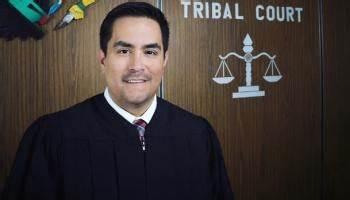Image Caption
Summary
Local Journalism Initiative Reporter
Windspeaker.com
Samuel Crowfoot doesn't believe his appointment to the tribunal for the Alberta Human Rights Commission (AHRC) will make all the difference for Indigenous people living in the province.
But he feels the pressure to deliver.
“I do feel like there’s a lot riding on my shoulders. I do feel like that there’s so much to be done and I just wish there wasn’t. And I do feel overwhelmed. But that’s what I’m here for,” said Crowfoot, who also serves as band councillor for the Siksika Nation.
“I know there is a lot of progress to be made by the tribunal. There’s a lot of progress and a lot of things the tribunal needs to accomplish and I’m here to help and assist them in any way,” he said.
The tribunal is a quasi-judicial independent arm of the AHRC.
The AHRC hears complaints of discrimination which fall under the protected areas of the Alberta Human Rights Act. “Goods, services, accommodation or facilities that are customarily available to the public” cannot be denied on the basis of race, religious beliefs, colour, gender, gender identity, gender expression, physical disability, mental disability, age, ancestry, place of origin, marital status, source of income, family status or sexual orientation.
As a tribunal member, Crowfoot will hear complaints that have first gone through the AHRC resolution process and have remained unsettled or have been appealed. He may be assigned as the lone member to mediate tribunal dispute resolutions or sit as one of three members assigned to tribunal hearings.
Crowfoot views his appointment as not only an opportunity for Indigenous peoples to see the AHRC as a viable option to pursue actions for compensation, but also as a means for Albertans to understand that Indigenous people are qualified for positions like this.
Crowfoot doesn’t want to appear critical of the tribunal, but he knows many Indigenous people, who face discrimination from police brutality or are ignored as they sit in waiting rooms in hospitals, don’t make use of the AHRC.
“If the people who are supposed to be taking care of us are actually discriminating (against) us and harming us, what safety do you have that the system that protects all Albertans will actually protect all Albertans?” said Crowfoot.
Of the 98 complaints dealt with by the AHRC from Jan. 7 to Aug. 29, 2022, two were filed by First Nations people who claimed discrimination based on race and ancestry. In one case a man and his mother said they were denied tenancy to rent an apartment because they were Indigenous. In another case, a lawyer said he was discriminated against for membership in a society because he is Indigenous. Both complaints were dismissed by the director.
Crowfoot says he’s tired of people thinking that human rights issues only occur in Africa or China. He says the Charter of Rights and Freedoms in Canada does not seem to apply to Indigenous peoples and Canada is not the human rights champion that many hold it up to be.
“The Indian Act in Canada has oppressed us. So I’m sick of the hypocrisy that Alberta and Canada is a safe haven. It isn’t…We’re not stupid people. We know. We see,” said Crowfoot.
As for non-Indigenous Albertans, Crowfoot believes that too many still do not understand the historical and intergenerational trauma caused by Indian residential schools. That’s by design, he points out, as residential schools were never part of the Alberta school curriculum. Twenty-five residential schools operated in Alberta with federal funding, the most in any province.
“I wouldn’t be surprised if (Albertans) knew very little about … Indigenous people. We’re not really prominent in Alberta holding political office outside of our own individual bands,” he said.
There are no provincial Indigenous MLAs and only one federal Indigenous Member of Parliament. NDP Blake Desjarlais, who is Métis, was elected as MP in Edmonton Griesbach last year.
“When we’re appointed to things like the human rights tribunal, I think it will give us more visibility and more credibility. People need to see—the greater community needs to see—qualified Indigenous people, qualified indigenous individuals in public and visible spaces because that’s going to help change our perspective in how we’re being viewed,” said Crowfoot.
Crowfoot says he takes everything he has experienced in his 44 years into his new position on the tribunal, which includes being a judge and his experiences in criminal justice and family law. He has served as the chief judge and program director for the Pueblo of Zuni Tribal Court in Zuni, New Mexico, and as an associate attorney for Rosette LLP in Chandler, Arizona.
He is now a Siksika band councillor and a member of the lead negotiating team concerning the 1910 Land Claim Surrender. He is also a father, a husband, a son, and a brother.
“Everything you do helps form and shape your opinions on your life … and I’ll be using that and applying the principles of fairness, applying the statutes of the Human Rights Act to this role, making decisions, writing decisions based on precedence and what is equality, what is fairness,” he said.
Crowfoot will be dealing with complaints brought forward by both Indigenous and non-Indigenous Albertans.
As for what he will view as a success from his time on the tribunal, he says it will be his growth, both personally and professionally, but also the impact he has on people.
“If I’m able to help change and improve the lives of Albertans … even if one person’s life is improved, I would say that’s a success,” he said.
Crowfoot is one of five new appointees to the tribunal, who will sit for a three-year term.
Local Journalism Initiative Reporters are supported by a financial contribution made by the Government of Canada.

